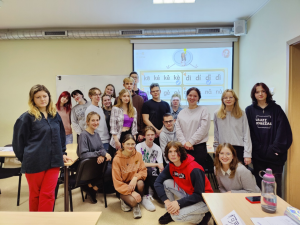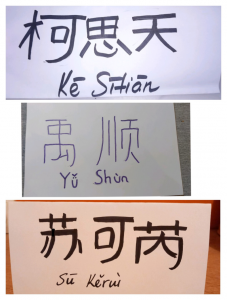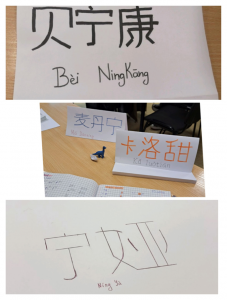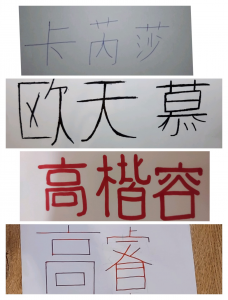The offline Chinese classes at Vidzeme University of Applied Sciences have been restarted after two years
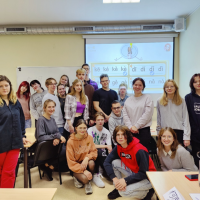
After seeing the autumn leaves, dusk, feeling the long history of the old town of Riga, and crossing the Gauja River, Zhu Yu, a Chinese volunteer, came to the peaceful Valmiera. On October 18th and 20th, 2022 local time, the offline Chinese classes at Vidzeme University of Applied Sciences, a teaching site under the Confucius Institute at the University of Latvia, restarted after two years.
The members of the zero-based class of Chinese language courses at Vidzeme University of Applied Sciences are composed of high school students and college students, and Chinese language courses are their interest courses and elective courses. Before the class, Miss Marite, an international study specialist from Vidzeme University of Applied Sciences, introduced Chinese teacher Zhu Yu to the students. When the Chinese class officially started, the teacher played a self-introduction video made in advance, which immediately aroused everyone’s interest. Then, in order to understand the students and the mutual understanding between the students, the teacher asked the students to come to the podium to introduce themselves, and established a Chinese learning group on What’s app with the help of mobile phones. Taking advantage of the active classroom atmosphere, let students write “one, two, three, four” using Chinese characters that are different from syllabic characters. It was the first time for the students to use a pen to write Chinese characters, and they felt very fresh, one by one magical symbols appeared on the paper. The teacher told the students that the strokes for writing Chinese characters had a certain order. Halfway through the class, the teacher started teaching Chinese pinyin and briefly introduced that Chinese pinyin consists of initials + finals + tones, followed by letting students know the initials, finals and tones. The students cooperated with the teacher and read aloud.
The teacher ended the first Chinese class in a relaxed and happy time. After the class, The teacher collected the names and birthdays of the students in the Chinese learning group, and gave Chinese names to 22 students.
At the beginning of the second class, the teacher showed everyone the new Chinese name and let everyone make a famous brand in 10 minutes. The students looked at their Chinese names eagerly, took out their pens and started to do it. Entering the formal lecture session, the teacher will teach the unit pronunciation by comparing it with the English phonetic symbol, making it easier for students to master the pronunciation of Chinese. After class, the teacher taught them “再见”. From simple daily language learning, the students are more likely to accept Chinese.
With the smooth progress of the first week of Chinese classes, Chinese language teaching kicked off in northeastern Latvia.
看过秋叶、黄昏、感受里加老城的悠久,穿过高亚河,汉语志愿者朱瑜来到了宁静的瓦尔米耶拉。当地时间2022年10月18日、20日,拉脱维亚大学孔子学院下设教学点维泽梅应用科技大学的线下汉语课时隔两年重新启动。
维泽梅应用科技大学汉语课零基础班成员由高中生和大学生组成,汉语课是他们的兴趣课和选修课。上课之前由维泽梅应用科技大学国际研究专家Marite老师向学生介绍汉语教师朱瑜。汉语课正式开始时,老师播放了提前制作的快闪自我介绍视频,视频顿时引起了大家的兴趣。接着,老师为了了解学生以及学生之间的互相认识,让学生走到讲台前介绍自己,借助手机建立了What’s app的汉语学习群。趁着课堂气氛活跃时,以区别于音节文字的汉字为切入点,让学生写“一、二、三、四”。学生们第一次拿笔写汉字,感到非常新鲜,一个个神奇的符号跃然纸上,老师告诉学生书写汉字的笔画有一定的顺序。课堂进行了一半,老师便从汉语的拼音教学,简单介绍了汉语的拼音由声母+韵母+声调组成,紧跟让学生认识声母、韵母以及声调,学生们都非常配合老师,大声朗读。
在轻松愉快的时光中结束了第一节汉语课,课后,我在汉语学习群里收集了学生的姓名、生日,分别给22个学生取了中文名字。
第二节课开始,老师向大家展示了新取的中文名字,并用10分钟让大家制作名牌。同学们看着自己的中文名字跃跃欲试,拿出笔开始动手。进入正式讲课环节,老师教授单元音时与英语音标对比教学,让学生更容易掌握汉语的发音。下课后,老师教了他们一句再见,从简单的日常用语学起,学生们更容易接受汉语。
随着第一周汉语课的顺利进行,汉语教学在拉脱维亚东北部拉开了帷幕。

